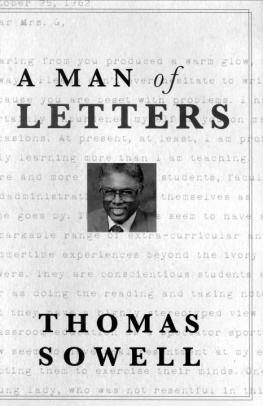Table of Contents
Copyright 1995 by Thomas Sowell.
Published by BasicBooks. A Member of the Perseus Books Group
All rights reserved. Printed in the United States of America. No part of this book may be reproduced in any manner whatsoever without written permission except in the case of brief quotations embodied in critical articles and reviews. For information, address BasicBooks, 10 East 53rd Street. New York, NY 10022-5299.
Designed by Ellen Levine
Library of Congress Cataloging-in-Publication Data
Sowell, Thomas, 1930-
The vision of the anointed : self-congratulation as a basis for social policy / Thomas Sowell.
p. cm.
Includes bibliographical references and index.
ISBN 0-465-08994-1 (cloth)
ISBN 0-465-08995-X (paper)
1. Elite (Social sciences)United States. 2. United StatesSocial policy. I. Title. HN90.E4S67 1995 305.520973-dc20
95-12670
CIP
00 01 RRD 20 19 18 17 16 15 14
At most only a tiny set of policies have been studied
with even moderate care.
George J. Stigler, Nobel Laureate in Economics
In the flaring parks, in the taverns, in the hushed academies,
your murmur will applaud the wisdom of a thousand
quacks. For theirs is the kingdom.
Kenneth Fearing, poet
PREFACE
The views of political commentators or writers on social issues often range across a wide spectrum, but their positions on these issues are seldom random. If they are liberal, conservative, or radical on foreign policy, they are likely to be the same on crime, abortion, or education. There is usually a coherence to their beliefs, based on a particular set of underlying assumptions about the worlda certain vision of reality.
Visions differ of course from person to person, from society to society, and from one era to another. Visions also compete with one another, whether for the allegiance of an individual or of a whole society. But in some eras one vision so predominates over all others that it can be considered the prevailing vision of that time and place. This is the current situation among the intelligentsia of the United States and much of the Western world, however much their vision may differ from the visions of most other people. Individual variations in applying this underlying vision do not change the fundamental fact that there is a particular framework of assumptions within which most contemporary social and political discourse takes place in the media, in academia, and in politics.
The rise of the mass media, mass politics, and massive government means that the beliefs which drive a relatively small group of articulate people have great leverage in determining the course taken by a whole society.
The analysis that follows is not only an examination of the vision of this elite intelligentsia and their numerous followers in the political arena and in the courtrooms, but is also an empirical comparison between the promised benefits of policies based on that vision and the grim and often bitter consequences of those political and judicial decisions. In short, the purpose is not simply to see what kind of world exists inside the minds of a self-anointed elite, but to see how that world affects the world of reality in terms as concrete as crime, family disintegration, and other crucial social phenomena of our times.
The immediacy of the issues involved only makes it more imperative to understand the past from which they came and the future toward which they lead. Many of the intellectual and political patterns analyzed here became dominant during the 1960s and many of the assumptions underlying todays continuations of those trends were either expressed or implied during that decade. However, the historical roots of the currently prevailing vision go back much further, in some cases for centuries. Both the past and the present must be explored, in order to understand the vision of the anointed and its dangerous legacy for the future.
Thomas Sowell
Hoover Institution
CHAPTER 1
FLATTERING UNCTION
Lay not that flattering unction to your soul.
Hamlet
Dangers to a society may be mortal without being immediate. One such danger is the prevailing social vision of our timeand the dogmatism with which the ideas, assumptions, and attitudes behind that vision are held.
It is not that these views are especially evil or especially erroneous. Human beings have been making mistakes and committing sins as long as there have been human beings. The great catastrophes of history have usually involved much more than that. Typically, there has been an additional and crucial ingredientsome method by which feedback from reality has been prevented, so that a dangerous course of action could be blindly continued to a fatal conclusion. Much of the continent of Europe was devastated in World War II because the totalitarian regime of the Nazis did not permit those who foresaw the self-destructive consequences of Hitlers policies to alter, or even to influence, those policies. In earlier eras as well, many individuals foresaw the self-destruction of their own civilizations, from the days of the Roman Empire to the eras of the Spanish, Ottoman, and other empires. Yet that alone was not enough to change the course that was leading to ruin. Today, despite free speech and the mass media, the prevailing social vision is dangerously close to sealing itself off from any discordant feedback from reality.
Even when issues of public policy are discussed in the outward form of an argument, often the conclusions reached are predetermined by the assumptions and definitions inherent in a particular vision of social processes. Different visions, of course, have different assumptions, so it is not uncommon for people who follow different visions to find themselves in opposition to one another across a vast spectrum of unrelated issues, in such disparate fields as law, foreign policy, the environment, racial policy, military defense, education, and many others. To a remarkable extent, however, empirical evidence is neither sought beforehand nor consulted after a policy has been instituted. Facts may be marshalled for a position already taken, but that is very different from systematically testing opposing theories by evidence. Momentous questions are dealt with essentially as conflicts of visions.
The focus here will be on one particular visionthe vision prevailing among the intellectual and political elite of our time. What is important about that vision are not only its particular assumptions and their corollaries, but also the fact that it is a prevailing visionwhich means that its assumptions are so much taken for granted by so many people, including so-called thinking people, that neither those assumptions nor their corollaries are generally confronted with demands for empirical evidence. Indeed, empirical evidence itself may be viewed as suspect, insofar as it is inconsistent with that vision.
Discordant evidence may be dismissed as isolated anomalies, or as something tendentiously selected by opponents, or it may be explained away ad hoc by a theory having no empirical support whateverexcept that this ad hoc theory is able to sustain itself and gain acceptance because it is consistent with the overall vision. Examples of such tactics will be numerous in the chapters that follow. What must first be considered are the reasons behind such tactics, why it is so necessary to believe in a particular vision that evidence of its incorrectness is ignored, suppressed, or discreditedultimately, why ones quest is not for reality but for a vision. What does the vision offer that reality does not offer?













